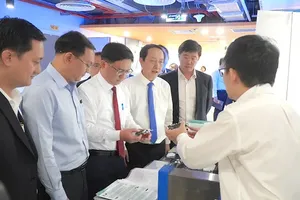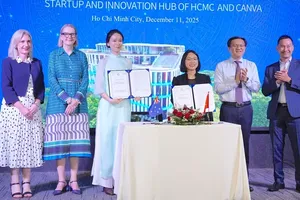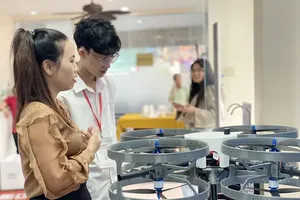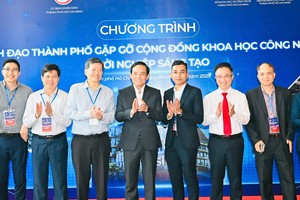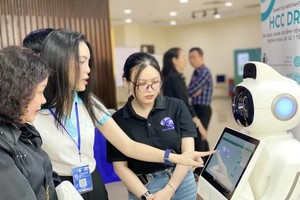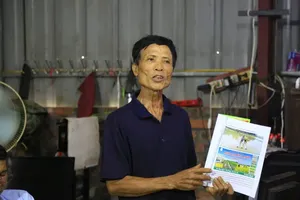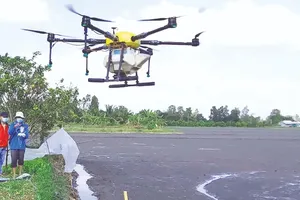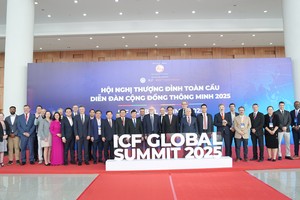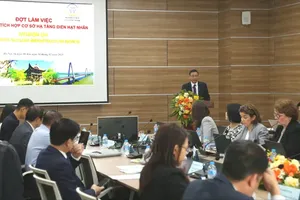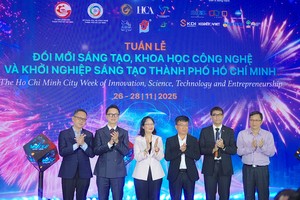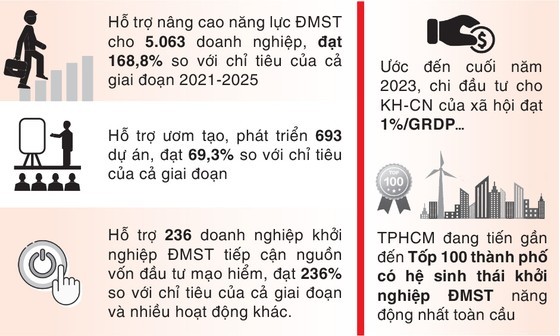 |
The results of two years implementing the project ‘Supporting the Innovative Startup Ecosystem in HCMC in the 2021-2025 Period’ (Project 672) (Photo: SGGP) |
The 2022 Global Innovation Index by the World Intellectual Property Organization (WIPO) reveals that Vietnam currently holds the highest ranking among developing countries, at the 48th position out of 132 nations and economies. It occupies the 4th position in Southeast Asia, preceded by Singapore (at the 7th position), Malaysia (36th position), and Thailand (43rd position).
In the 2022 Global Startup Ecosystem Map established by Startup Blink, Vietnam’s innovative startup ecosystem stays at the 54th position worldwide and the 12th in Pacific – Asia.
These promising rankings have shown the potential of Vietnam despite its many challenges when the macroeconomic and geopolitical factors in the world are still rather complicated and unstable.
Deputy Minister of Science and Technology Tran Van Tung shared that the implementation of intelligence power, new business models, and science-technology to create more added values, address personal and public problems must be a guideline for the whole country.
Therefore, the community must cooperate to establish the national innovation system and the innovative startup ecosystem. Even though such missions as using innovation in education – training, boosting commercialization, exploiting and developing intellectual properties and their rights, forming a network of innovative and scientific-technological enterprises, growing a globally linked innovation network are a tough challenge, they must be carried out.
Representative of UNESCO in Vietnam Christian Manhart stressed that innovation is the core of sustainable development in an unstable world now. There must be a favorable environment to promote innovation, coming from high-quality education for all people and youth empowerment so that they can express their viewpoints and turn their valuable ideas into reality.
He added that to achieve the target of being a high-income developed country in 2045, in the upcoming time, Vietnam should strongly push innovation and ensure that each person in the community is able to make contribution.
From a business perspective, President of IP Group Ngo Dac Thuan shared that innovative activities in companies still mostly depend on factories and the core technologies brought by foreign corporations. Hence, it is advisable to raise the role of intellectual properties, in particular patents – the factor determining the efficiency of innovation. This is the key to boosting the innovation capacity of domestic enterprises and correspondingly their competitiveness against international counterparts.
The 6th session of the 13th-tenure Party Central Committee issued Resolution No.29-NQ/TW on the continued enhancement of national industrialization and modernization by 2030, with a vision to 2045. This resolution highly values the role of science-technology and innovation when stating that both are the foundation of industrialization and modernization.
The growth of these two factors in the near future should focus on improving the level of the labor force, accelerating economic restructuring, developing infrastructure with top priority on high added values and technology. It is necessary to increase state budget allocation (based on GDP) to science-technology and innovation so that by 2030, Vietnam will have entered the group of three leading countries in the region as to state budget spending on science-technology and innovation.
Until 2030, Vietnam should form its national innovation system, linked to domestic and global value chains in the industries with high export turnover and revenue. Besides creating more open innovation platforms and networks, the country should boost the appearance of science-technology and innovation among businesses. These organizations are encouraged to establish research or innovation centers. Meanwhile, the operation mechanisms of key laboratories invested by the State must be reviewed and upgraded.
In the working session with the Ministry of Science and Technology on Vietnam Science-Technology Day (May 18), Prime Minister Pham Minh Chinh said that the successes of the US, Japan, Germany, the Republic of Korea, Israel, and Chine in applying science-technology and innovation have become our driving force so that Vietnam itself can also become a leading country in Industry 4.0.
The 13th Party Congress continued to approve the growth of science-technology and innovation under the view of ‘improving the quality of the human resources, introducing breakthrough mechanisms to attract talented people, implementing science-technology and promoting innovation for a quicker and more sustainable development of the country’.
The Prime Minister then stressed that it is essential to nurture the innovative, scientific-technological spirit, to hire excellent teachers and researchers to work in research institutes and universities, to employ outstanding scientific managers to develop suitable policies for innovative, scientific-technological promotion, to apply innovative thinking and strategic visions along with strong determination in order to effectively exploit the country’s competitive advantage for national growth.
So as to adopt the Scientific-technological Development Strategies in the 2021-2030 Period with a Vision to 2045, it is compulsory to drastically upgrade thinking and actions. This will in turn help to mobilize and use all possible resources in the community, especially intellectual and creativity.
Head Vu Van Tich of the Science-Technology Department in Vietnam National University – Hanoi informed that innovation in scientific-technological activities began 10 years ago with the appearance of the project ‘Supporting the National Innovative Startup Ecosystem until 2025’ (Project 844), chaired by the Science and Technology Ministry. It has basically changed the national industry.
To continue achieve successes, the Government and in particular the Science & Technology Ministry should maintain the investments to establish corresponding innovative ecosystems in the four sides of Government – business – university – research institute in order to be a driving force for socio-economic growth. Major universities should receive more investment priority, while universities in general should be allowed to pilot certain breakthrough policies and mechanisms to apply results of innovative activities in reality.

